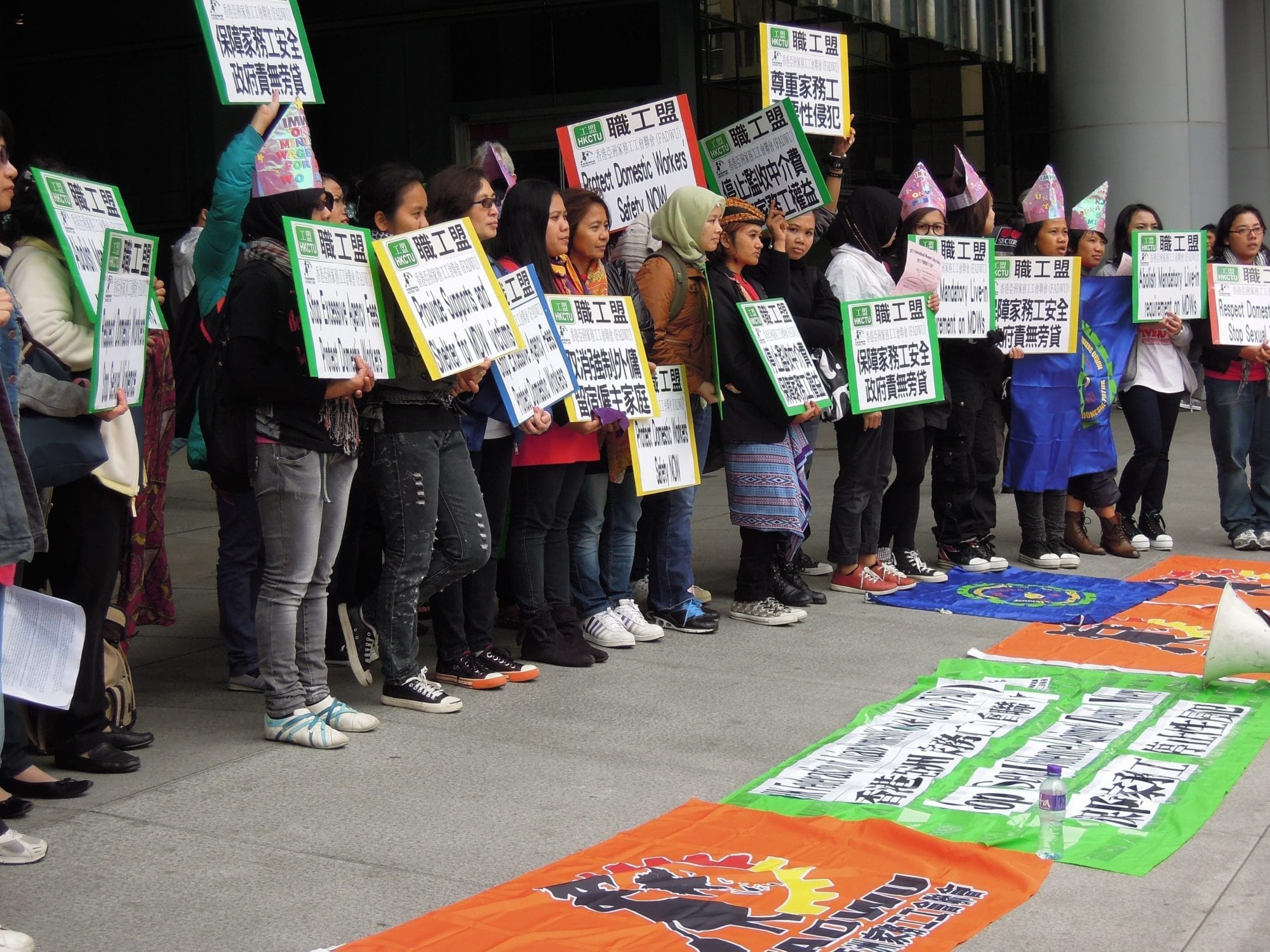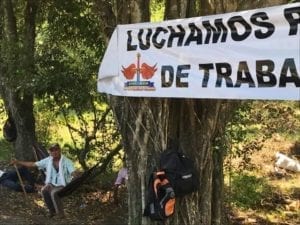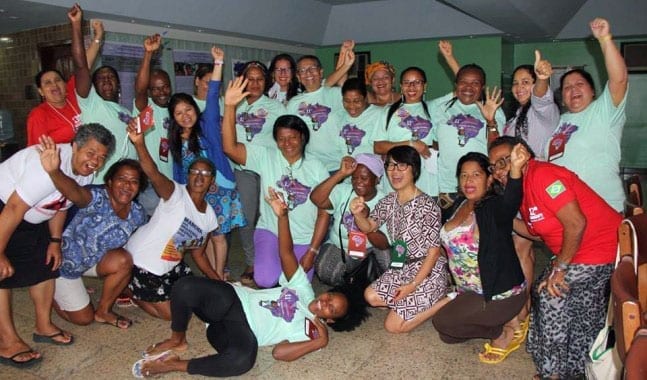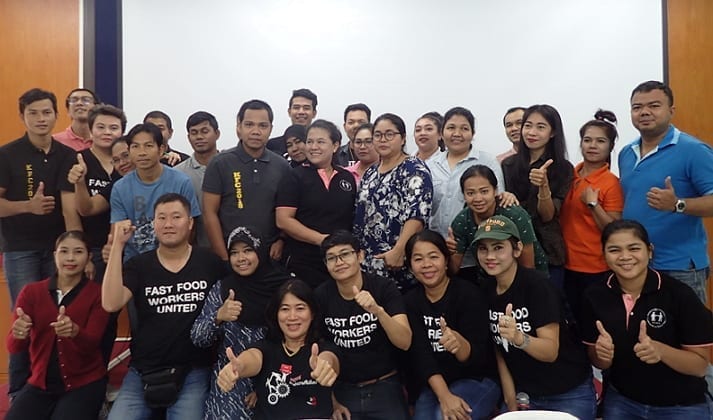
Feb 16, 2018
Migrant domestic workers in Hong Kong, Special Administrative Region of China, must live with their employers, according to a court ruling this week that rejected a case by a Philippine migrant worker who argued the rule violates Hong Kong SAR’s Bill of Rights and other basic laws.

Credit: Sally Choi
Expressing disappointment in the court’s decision, the Federation of Asian Domestic Workers Unions (FADWU) vowed to continue to demand that “the government revise regulations that prohibit living (outside the employer’s home) and develop concrete policies to ensure that migrant domestic workers who live with their employers enjoy reasonable living conditions.”
Among the 400,000 domestic workers in Hong Kong, SAR 335,500 are migrant domestic workers. Isolated in homes, they often are subject to physical and verbal abuse and subjected to overwork and poor living conditions. Some 52 million domestic workers are employed in countries where they are completely excluded from national labor laws.
Although Hong Kong, SAR laws cover the working conditions of domestic workers, FADWU urged the government to enforce the laws.
“The government should also take the responsibility to ensure enforcement and to conduct inspections to ensure that migrant domestic workers’ rights to privacy, self-improvement, rest time and private life are protected, and also to ensure that migrant domestic workers have safe working environments, equality and dignity,” the union says in a statement.
On Sunday, hundreds of migrant domestic workers rallied at Hong Kong SAR’s City Hall to demand an end to violence against women, and called on the government to reform regulations covering migrant workers to ensure they work regular hours, receive decent food and sleeping quarters.

Feb 16, 2018
More than 1,000 palm oil workers in Colombia ended a 20-day strike this week after winning a preliminary agreement with the Indupalma plantation that takes first steps toward formalizing their work status.

A banner on the plantation describes the palm oil workers’ struggle for decent treatment on the job. Credit: Solidarity Center/Lauren Stewart
As subcontracted workers, the palm oil workers have no rights under Colombia’s labor laws, including the minimum wage, freedom of association and the right to negotiate working conditions. They walked off the job outside San Alberto January 25 to demand formal work status.
Under the preliminary agreement, the union and the employer will determine by March 7 which employees qualify for formalized status, and will then negotiate the details of the formalization process, with a September 7 deadline.
Representatives from the Colombia Ministry of Labor moderated the discussions between the employer and the workers’ union, the General Union of Third-Party Agribusiness Workers (UGTTA). Throughout the process, the workers and their union received support from the Central Union of Workers (CUT), AFL-CIO and Solidarity Center, along with a regional labor rights center (CAL); Escuela Nacional Sindical; the Corporation for Judicial Freedom (CJL); and Pacto Obrero, a coalition of unions in the palm sector.

Palm oil workers stood strong during a 20-day strike at the Indupalma plantation in San Alberto. Credit: Solidarity Center/Lauren Stewart
Also this week, a delegation from the U.S. Department of Labor met with Colombian officials to follow up on the country’s progress with addressing noncompliance with labor provisions under the U.S.-Colombia Free Trade Agreement. The AFL-CIO and five Colombian labor organizations, including CUT, filed a trade submission in 2016 that pointed to illegal subcontracting and other violations of the trade agreement.
Unlike workers who are recognized as employees, subcontracted palm oil workers must purchase their own tools, as well as join and pay dues to phony “cooperatives”—structures that enable companies to evade legal responsibilities under the labor law.
The palm oil workers formed UGTTA last year, and despite the region’s history of threats and violence against workers who unionize, the union has grown from 248 to some 1,010 members. The union reports four members have received death threats in 2018.

Feb 8, 2018
Following years of campaigning by domestic workers and their allies across Brazil, the government in recent days ratified the International Labor Organization Domestic Workers Convention (No. 189), a binding standard in which domestic workers are entitled to full labor rights, including those covering work hours, overtime pay, safety and health standards and paid leave. Brazil is the twenty-fifth country to ratify Convention 189 and the fourteenth in the Americas region.
Since the ILO passed the convention in 2011, the National Federation of Domestic Workers (FENATRAD), the National Confederation of Retail and Service Workers (CONTRACS) and the Central Union of Workers (CUT) were among unions pushing for its ratification, ultimately securing 1.2 million signatures urging the government to ratify the measure.
In a statement celebrating ratification, FENATRAD also vows to continue in the “daily struggle for dignity, valorization and recognition of domestic work, work that moves and creates conditions for other workers to dedicate themselves to productive activities.”
Brazil Economy Slumps as Labor Rights Attacked
The majority of the 7 million domestic workers in Brazil are women, primarily indigenous people and Afro-Brazilians. Brazil’s slumping economy has seen a sharp increase of workers in the informal-sector jobs, with 121,000 domestic worker jobs created between December 2014 and April 2017. At the same time, more than 3.2 million jobs were lost in the formal private sector and some 600,000 jobs lost in the public sector, according to the Department of Statistics and Socioeconomic Studies in Brazil (DIEESE).
Further, more than 9 million people have been pushed below the poverty line since 2015 and 800,000 Brazilians entered the ranks of the unemployed between January and August 2017.
Although workers are celebrating passage of the Domestic Workers Convention, they say a labor reform law passed last year severely weakens their fundamental rights on the job. The law in part dismantles provisions on overtime pay and working hours; creates new forms of precarious contracting, such as “zero-hour” contracts that do not guarantee a minimum wage; and permits pregnant women and breastfeeding mothers to work in unhealthy environments.
The law also disproportionately impacts historically disadvantaged workers, such as women and Afro-Brazilians, who earn less and are much more likely to be unemployed or underemployed than their white male counterparts.
“The convention is to guarantee decent work, unlike the new law that removes basic rights of the worker and the worker,” says Myllena Calazans, a lawyer with FENATRAD.
With Solidarity Center support, FENATRAD recently registered as a national federation, became a member of the International Domestic Workers Federation (IDWF) and is connecting with regional domestic worker organizations.
The Solidarity Center is also assisting the federation in education and outreach, including creation of a crossword puzzle magazine that informs Brazilian domestic workers about their rights. Many domestic workers spend numerous hours on public transportation commuting to and from work and do crossword puzzles during their commutes.

Feb 6, 2018

Apantree Charoensak, union president, was fired from her position at Yum! Thailand during contract negotiations. Credit: Solidarity Center/Tula Connell
Some 2,000 fast food workers and supervisors at one of Thailand’s largest KFC franchises recently won the first-ever collective bargaining agreement in the kingdom’s fast food industry, a pact that includes an early retirement program, 23 meals provided by the company per year and motorcycle maintenance funds for delivery workers.
The contact also includes the right to union representation in any dispute or grievance, and paid union leave.
The workers are among 2,400 members represented by the Cuisine and Service Workers’ Union, an IUF affiliate.
During negotiations last month, union President Apantree Charoensak, who has been leading the struggle for fast food workers across Thailand for nearly a decade, was fired from her position at Yum! Thailand, which operates some of the KFC franchises. (The new contract covers KFC franchises run by Restaurant Development Ltd., which operates 130 of the 586 KFC restaurants in Thailand.)
Women representing 50 organizations in Thailand issued a statement of solidarity with Charoensak and submitted it to management of Yum! Thailand in Bangkok. Charoensak, along with two co-workers, had been previously dismissed in 2011 following her efforts to organize a union and negotiate a contract with Yum! Thailand. She and her co-workers were reinstated after filing a complaint with the country’s Labor Relations Commission describing their dismissal as retaliation for union activity, an action prohibited under Thai law.
Charoensak, a manager at the corporation where she supervised up to a dozen restaurants, says she began union organizing to rectify what she saw as a large pay disparity between front-line workers and managers. Ultimately two unions formed, one covering front-line employees and one for supervisors. Over the years, she says management also tried to end her union activism by offering her large sums of money, which she refused, and isolated her at work, giving her little to do—time she filled by completing a master’s degree in political science and addressing union members’ concerns.

Feb 5, 2018
Hundreds of women in western Zimbabwe who have waged a week-long sit-in at Hwange Colliery Co. Ltd. (HCCL), demanding unpaid wages for their husbands who labor in the company’s coal mines, say they are set to march to tourist-packed Victoria Falls. There, says the women’s spokesperson, Thokozile Ncube, “we will tell the world everything about the company and how our government has failed us.”
Carrying placards reading, “Five years no pay, but going to work everyday,” and “Enough is enough,” the women say they are not satisfied with the response of a former government minister who spoke with them Friday and said he would take their concerns to the president. The women vowed that if their husbands do not receive the wages owed since 2014 by February 15, they will march to Victoria Falls, some 62 miles to the north.
They also demand the resignation of the company’s CEO, who they say has not fulfilled a 2016 High Court order compelling management to pay workers’ back wages.
The women launched their action January 29 with a peaceful rally and have remained at the company’s headquarters, despite heavy rains. Last week, the National Mineworkers Union of Zimbabwe (NMWUZ) provided a tent to shelter the women.
Several thousand miners work in open-pit mines extracting millions of pounds of coal each month for use by power stations and in iron and steel smelting. Most of the workers live in houses in the mining village.
According to news reports, HCCL has been paying miners 50 percent of their salaries since the beginning of 2016 and last June, the company paid 7 percent of the employees’ 2014 outstanding wages.









